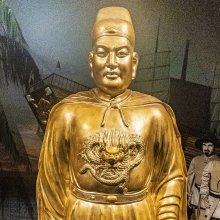Bhikkhu, Bhikhu: 11 definitions
Introduction:
Bhikkhu means something in Buddhism, Pali, the history of ancient India, Jainism, Prakrit. If you want to know the exact meaning, history, etymology or English translation of this term then check out the descriptions on this page. Add your comment or reference to a book if you want to contribute to this summary article.
Images (photo gallery)
In Buddhism
Theravada (major branch of Buddhism)
Source: Access to Insight: A Glossary of Pali and Buddhist TermsBuddhist monk; a man who has given up the householders life to live a life of heightened virtue (see sila) in accordance with the Vinaya in general, and the Patimokkha rules in particular. See sangha, parisa, upasampada.Source: Dhamma Dana: Pali English GlossaryM (A being who renounces (the pleasures of the world)). The most often, this term refers to Buddhas disciples, to the members of the sangha. To be a bhikkhu, one should give up all worldly possessions except a bowl, a robe and a few utensils such as a razor, a tooth brush, a water filter, etc. One should then perform a specific ceremony that does unfold according to the rules of the appropriate kammavaca, within a sima, in the presence of at least five bhikkhus, and positively answer fifteen questions.
Basically, this term defines the one who seeks detachment and strives to follow this path (with a shaven head or not). The bhikkhu is someone who abandons all enterprises and everything that can bring some enjoyment, possessions or fame. He relentlessly trains for liberation and remains vigilant and attentive to everything that appears to his mind. The rest of the time, he studies and teaches the dhamma.
See also: The monks
Source: Pali Kanon: Manual of Buddhist Terms and DoctrinesA fully ordained disciple of the Buddha is called a bhikkhu.
"Mendicant monk" may be suggested as the closest equivalent for "Bhikkhu", literally it means "he who begs" but bhikkhus do not beg. They silently stand at the door for alms. They live on what is spontaneously given by the supporters.
He is not a priest as he is no mediator between God and man. He has no vows for life, but he is bound by his rules which he takes of his own accord. He leads a life of voluntary poverty and celibacy. If he is unable to live the Holy Life, he can discard the robe at any time.
Theravāda is a major branch of Buddhism having the the Pali canon (tipitaka) as their canonical literature, which includes the vinaya-pitaka (monastic rules), the sutta-pitaka (Buddhist sermons) and the abhidhamma-pitaka (philosophy and psychology).
General definition (in Buddhism)
Source: Wisdom Library: BuddhismBhikkhu:—Monk
Source: Buddhist Door: GlossaryBhiksu in Sanskrit, Bhikkhu in Pali. A monk, who has left home, is fully ordained to follow the way of the Buddha, and depends on alms for a living.
Source: WikiPedia: BuddhismA Bhikkhu, (Sanskrit: Bhiksu) is a fully ordained male Buddhist monastic. Female monastics are called Bhikkhunis (Skt: Bhiksunis). Bhikkhus and Bhikkhunis keep many precepts: they live by the vinayas framework of monastic discipline, the basic rules of which are called the patimokkha. Their lifestyle is shaped so as to support their spiritual practice, to live a simple and meditative life, and attain Nirvana.
The Dhammapada states:
Source: Buddhism Tourism: Glossary of Buddhist TermsNot therefore is he a bhikkhu
Merely because he begs from others.
Not by adopting the outward form
Does one truly become a bhikkhu.
He who wholly subdues evil,
Both small and great,
Is called a monk (bhikkhu)
Because he has overcome all evil. Dhp 266, 267
Techincal term for mendicant monk, a religious prefessional who has abandoned worldly pleasures to attain Buddhist idea of nirvana.
Source: Amaravati: GlossaryBuddhist monk(s).
India history and geography
Source: Singhi Jain Series: Ratnaprabha-suri’s Kuvalayamala-katha (history)Bhikkhu (भिक्खु) refers to one of the sixty doctrines of different religious sects that existed in ancient India, as mentioned by Uddyotanasūri in his 8th-century Kuvalayamālā (a Prakrit Campū, similar to Kāvya poetry).—Page 203.20 f.: There is a detailed description of about 60 doctrines of different religious sects and schools of philosophy that had developed before the time of Uddyotanasūri, for example, [Bhikkhu] [...]. This list of different sects of Uddyotanasūri’s may be compared with the lists given by Bāṇa in the Harṣacarita (Books 5, 8).

The history of India traces the identification of countries, villages, towns and other regions of India, as well as mythology, zoology, royal dynasties, rulers, tribes, local festivities and traditions and regional languages. Ancient India enjoyed religious freedom and encourages the path of Dharma, a concept common to Buddhism, Hinduism, and Jainism.
Languages of India and abroad
Pali-English dictionary
Source: BuddhaSasana: Concise Pali-English Dictionarybhikkhu : (m.) a Buddhist monk.
Source: Sutta: The Pali Text Society's Pali-English DictionaryBhikkhu, (cp. later Sk. bhikṣu, fr. bhikṣ) an almsman, a mendicant, a Buddhist monk or priest, a bhikkhu. ‹-› Nom. sg. bhikkhu frequent passim; Vin. III, 40 (vuḍḍhapabbajita); A. I, 78 (thera bh. , an elder bh. ; and nava bh. a young bh.); III, 299 (id.); IV, 25 (id.); Sn. 276, 360, 411 sq. , 915 sq. , 1041, 1104; Dh. 31, 266 sq. , 364 sq. , 378; Vv 801; Acc. bhikkhuṃ Vin. III, 174; Dh. 362, & bhikkhunaṃ Sn. 87, 88, 513; Gen. Dat. bhikkhuno A. I, 274; Sn. 221, 810, 961; Dh. 373; Pv. I, 1010; & bhikkhussa A. I, 230; Vin. III, 175; Instr. bhikkhunā Sn. 389. pl. Nom. bhikkhū Vin. II, 150; III, 175; D. III, 123; Vism. 152 (in sim.); VbhA. 305 (compared with amaccaputtā) & bhikkhavo Sn. 384, 573; Dh. 243, 283; Acc. bhikkhu Sn. p. 78; M. I, 84; Vv 2210; & bhikkhavo Sn. 384, 573; Gen. Dat. bhikkhūnaṃ Vin. III, 285; D. III, 264; Sn. 1015; Pv. II, 17; & bhikkhunaṃ S. I, 190; Th. 1, 1231; Instr. bhikkhūhi Vin. III, 175; Loc. bhikkhūsu A. IV, 25, & bhikkhusu Th. 1, 241, 1207; Dh. 73; Voc. bhikkhave (a Māgadhī form of Nom. bhikkhavaḥ) Vin. III, 175; Sn. p. 78; VvA. 127; PvA. 8, 39, 166; & bhikkhavo Sn. 280, 385.
There are several allegorical etymologies (definitions) of the word bhikkhu, which occur frequently in the commentaries. All are fanciful interpretations of the idea of what a bhikkhu is or should be, and these qualities were sought and found in the word itself. Thus we mention here the foll. (a) bhikkhu=bhinnakilesa (“one who has broken the stains” i.e. of bad character) VbhA. 328; VvA. 29, 114, 310; PvA. 51. ‹-› (b) Another more explicit explanation is “sattannaṃ dhammānaṃ bhinnattā bhikkhu” (because of the breaking or destroying of 7 things, viz. the 7 bad qualities, leading to rebirth, consisting of sakkāyadiṭṭhi, vicikicchā, sīlabbata-parāmāsa, rāga, dosa, moha, māna). This def. at Nd1 70=Nd2 477a.—(c) Whereas in a & b the first syllable bhi(-kkhu) is referred to bhid, in this def. it is referred to bhī (to fear), with the further reference of (bh-) ikkh(u) to īkṣ (to see), and bhikkhu defined as “saṃsāre bhayaṃ ikkhati ti bh.” Vism. 3, 16 (saṃsāre bhayaṃ ikkhaṇatāya vā bhinna-paṭa-dharaditāya vā).—A very comprehensive def. of the term is found at Vbh. 245—246, where bhikkhu-ship is established on the ground of 18 qualities (beginning with samaññāya bhikkhu, paṭiññāya bh. , bhikkhatī ti bh. , bhikkhako ti bh. , bhikkhācariyaṃ ajjhupagato ti bh. , bhinna-paṭa-dharo ti bh. , bhindati pāpake dhamme ti bh. , bhinnattā pāpakānaṃ dhammānan ti bh. etc. etc.).—This passage is explained in detail at VbhA. 327, 328.—Two kinds of bhikkhus are distinguished at Ps. I, 176; Nd1 465=Nd2 477b, viz. kalyāṇa(—ka-)puthujjana (a layman of good character) and sekkha (one in training), for which latter the term paṭilīnacara (one who lives in elimination, i.e. in keeping away from the dangers of worldly life) is given at Nd1 130 (on Sn. 810).

Pali is the language of the Tipiṭaka, which is the sacred canon of Theravāda Buddhism and contains much of the Buddha’s speech. Closeley related to Sanskrit, both languages are used interchangeably between religions.
Prakrit-English dictionary
Source: DDSA: Paia-sadda-mahannavo; a comprehensive Prakrit Hindi dictionaryBhikkhu (भिक्खु) in the Prakrit language is related to the Sanskrit word: Bhikṣu.
Prakrit is an ancient language closely associated with both Pali and Sanskrit. Jain literature is often composed in this language or sub-dialects, such as the Agamas and their commentaries which are written in Ardhamagadhi and Maharashtri Prakrit. The earliest extant texts can be dated to as early as the 4th century BCE although core portions might be older.
See also (Relevant definitions)
Starts with: Bhikkhu Bodhi, Bhikkhu Buddhadasa, Bhikkhu Samyutta, Bhikkhu Sutta, Bhikkhu Vagga, Bhikkhu Vibhanga, Bhikkhubhava, Bhikkhudasika, Bhikkhugatika, Bhikkhuka, Bhikkhumda, Bhikkhuna Sutta, Bhikkhuni, Bhikkhuni Khandhaka, Bhikkhuni Samyutta, Bhikkhuni Sutta, Bhikkhuni Vibhanga, Bhikkhunivasaka Sutta, Bhikkhupatimokkha, Bhikkhusangha.
Ends with: Ehibhikkhu, Pakatattabhikkhu, Sabhikkhu.
Full-text (+412): Upasampada, Kuti, Bhikkhuka, Theyyasamvasaka, Vassa, Thera, Mahathera, Atirita, Uppabbajjta, Bhikkhugatika, Patimokkha, Parajika, Majjhima Pansukulika, Abbhana, Desana, Bhikkhusangha, Manatta, Samanera, Civara, Pindapata.
Relevant text
Search found 136 books and stories containing Bhikkhu, Bhikhu; (plurals include: Bhikkhus, Bhikhus). You can also click to the full overview containing English textual excerpts. Below are direct links for the most relevant articles:
The Great Chronicle of Buddhas (by Ven. Mingun Sayadaw)
Part 4 - The Seven Factor of Non-decline of Bhikkhu < [Chapter 40 - The Buddha Declared the Seven Factors of Non-Decline for Rulers]
Part 29 - The Discourse at Bhoga on the Four Great Authorities (Mahāpadesas) < [Chapter 40 - The Buddha Declared the Seven Factors of Non-Decline for Rulers]
Part 7 - The Noble Practice of Fraternal Living (Sāranīya) < [Chapter 40 - The Buddha Declared the Seven Factors of Non-Decline for Rulers]
Vinaya (3): The Cullavagga (by T. W. Rhys Davids)
Cullavagga, Khandaka 1, Chapter 6 < [Khandaka 1 - The Minor Disciplinary Proceedings]
Cullavagga, Khandaka 2, Chapter 1 < [Khandaka 2 - Probation and Penance (A)]
Cullavagga, Khandaka 10, Chapter 19 < [Khandaka 10 - On the Duties of Bhikkhunis]
The Bhikkhus Rules (by Bhikkhu Ariyesako)
A Bhikkhus Steward < [Chapter 3 - Possessions And Offerings]
Frequently Asked Questions < [Part One]
The Mendaka Allowance < [Chapter 3 - Possessions And Offerings]
Banner of the Arahants (by Bhikkhu Khantipalo)
Chapter 3 - The Sangha And The Development Of Vinaya
Chapter 4 - The Sangha And The Spread Of Buddhism
Vinaya (1): The Patimokkha (by T. W. Rhys Davids)
Chapter 7 - The Patidesaniya Rules
Chapter 3 - The Samghadisesa Rules
Guide to Tipitaka (by U Ko Lay)
Book 2 - Pacittiya Pali < [Chapter II - Vinaya Pitaka]
(c) Admission Of Bhikkhunis Into The Order < [Chapter I - What Is Vinaya Pitaka?]
Book 1 - Parajika Pali < [Chapter II - Vinaya Pitaka]

